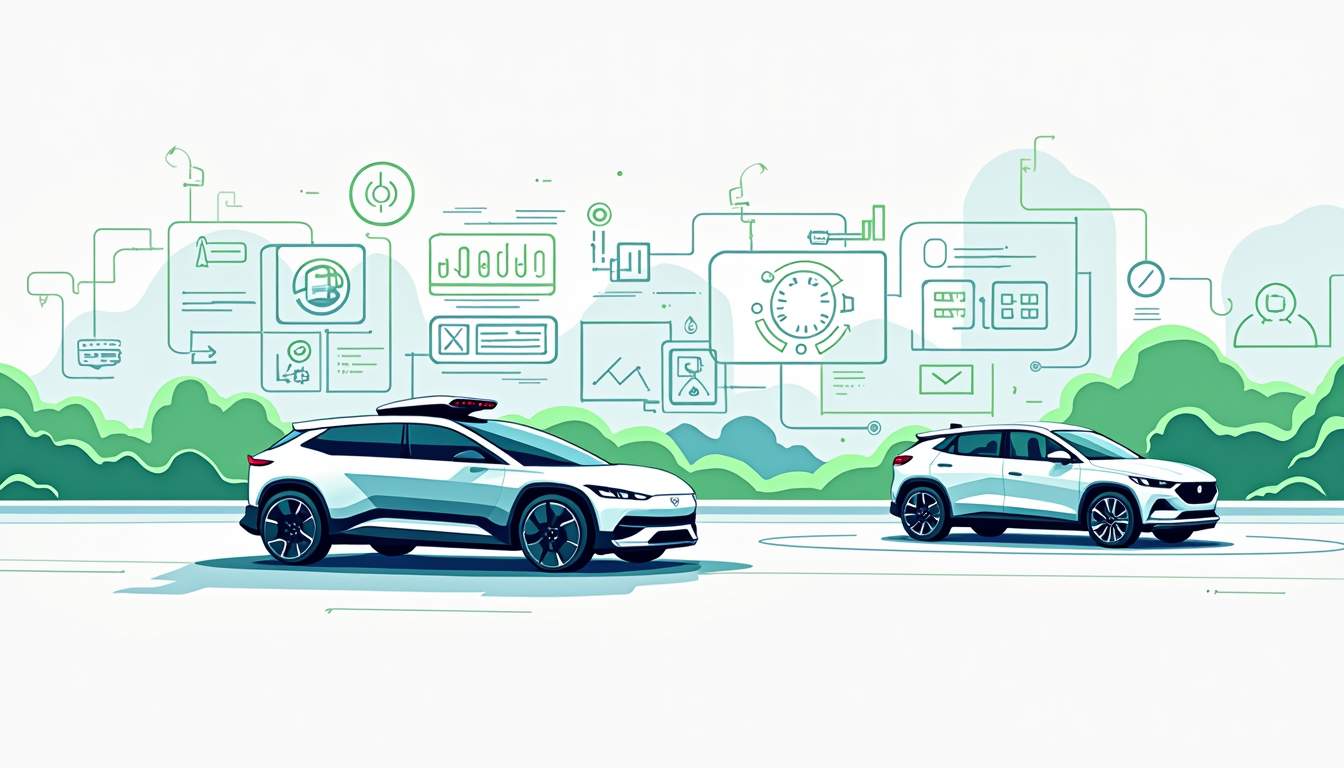The auto transport industry is on the brink of a revolutionary transformation, largely driven by the rapid advancements in artificial intelligence (AI) and cutting-edge technologies. As we approach 2025, examining how these innovations reshape the sector is crucial, enhancing efficiency, safety, and the overall customer experience. This article explores the evolution of auto transport technology, the pivotal AI technologies influencing the industry, their benefits, and the challenges that lie ahead.
Tracing the Evolution of Auto Transport Technology
The evolution of auto transport technology has been extraordinary, mirroring changes in societal demands and technological progress over the years. From the advent of railroads to the latest breakthroughs in vehicle design and logistics management, each phase signifies a significant leap forward. Technology integration in the transport industry began with mechanized vehicles, revolutionizing the movement of goods and people.
In the late 20th century, the emergence of GPS tracking and route optimization allowed for improved navigation and delivery efficiency. The rise of the internet further streamlined communication and coordination among transport companies. Entering the 21st century, the rapid advancements in AI have opened up entirely new possibilities. For more on the impact of AI, visit our section on AI’s role in modernizing auto transport.
A Historical Perspective on Auto Transport Innovations
The auto transport industry has historically witnessed groundbreaking innovations. The introduction of automated systems enabled real-time inventory and vehicle status tracking, laying the foundation for today’s digital and automated logistics. The emergence of electric vehicles (EVs) and hybrid models marked another critical milestone, reflecting growing environmental concerns.
As technology advanced, predictive analytics became integral to streamlining operations and refining strategic decision-making. This historical context highlights the rapid transformation pace we experience today. The shift from traditional fuel sources to sustainable options has not only changed the vehicles on the road but also prompted a rethinking of infrastructure, such as charging stations and maintenance facilities, to accommodate this new wave of transportation technology.
AI’s Role in Modernizing Auto Transport
Modern auto transport increasingly relies on AI technologies to enhance operational efficiency. AI algorithms analyze vast datasets, predicting traffic patterns and vehicle maintenance needs and optimizing routes based on real-time conditions. This capability empowers logistics companies to make data-driven decisions, reducing fuel consumption and enhancing delivery times.
AI is also reshaping customer service within the transport industry. AI-powered chatbots and virtual assistants provide real-time assistance and information to customers, improving communication and reducing response times.
Key AI Technologies Transforming the Industry
As AI technology evolves, several key technologies emerge as transformative forces within the auto transport industry. These include machine learning, autonomous vehicles, and blockchain, each offering unique capabilities to address various industry challenges.

Machine Learning and Predictive Analytics
Machine learning, a subset of AI, plays a crucial role in predictive analytics by utilizing historical data to forecast future trends. Companies can enhance their planning capabilities by analyzing patterns in shipping schedules, fuel usage, and vehicle performance, thereby increasing efficiency.
Predictive analytics empowers logistics managers to allocate resources better, streamline operations, and ultimately reduce operational costs. This data-centric approach enables enhanced strategic decision-making across the board.
Autonomous Vehicles and Their Impact
One of the most groundbreaking innovations in auto transport is the development of autonomous vehicles (AVs). These self-driving technologies promise to transform how goods are transported. By operating without human intervention, AVs can potentially reduce the risk of accidents caused by human error, lower transportation costs, and improve delivery speeds.
The integration of AVs also indicates a shift in labor dynamics within the industry, as companies will need to navigate the implications of reducing human drivers in favor of automation.
Blockchain for Enhanced Security and Transparency
Blockchain technology offers a decentralized ledger that enhances security and transparency in the auto transport sector. By allowing all parties involved in the supply chain to access and verify data, blockchain reduces fraud risks and increases stakeholder trust. This technology ensures that each step of the transport process is recorded and immutable, providing customers with real-time tracking and assurance regarding their shipments.
Moreover, blockchain can facilitate smart contracts, automate transactions, and reduce overhead costs associated with traditional methods.
Benefits of AI Integration in Auto Transport
Integrating AI and related technologies into the auto transport industry is not merely a trend; it has numerous benefits that can revolutionize operations and positively impact stakeholders. Efficiency, safety, and customer experience are just a few of the numerous advantages that AI offers.
Increased Efficiency and Cost Reduction
AI technologies enable auto transport companies to operate more efficiently, significantly reducing costs. By automating routine tasks such as scheduling and routing, businesses can allocate resources better, streamline their operations, and ultimately drive profits.
Additionally, AI’s ability to analyze data in real time allows companies to make informed decisions that enhance their operational flow. Reduced fuel consumption and lower maintenance costs further contribute to improved profitability in the industry.
Improved Safety and Risk Management
Safety concerns are central to auto transport, and AI enhances safety measures. Advanced AI algorithms can predict and identify potential hazards, allowing logistics firms to implement proactive measures. Real-time monitoring systems can alert drivers about dangerous conditions, significantly minimizing the risk of accidents.
Moreover, AI systems can analyze driving behavior patterns, offering insights to improve guidelines for drivers and further enhancing safety on the roads.
Enhanced Customer Experience
Incorporating AI in auto transport leads to an improved customer experience, which is critical for maintaining competitiveness in a rapidly evolving market. Real-time tracking offers customers visibility over their shipments, while AI-driven customer service solutions provide responsive assistance that improves satisfaction.
Companies’ ability to personalize services based on customer preferences and feedback enhances brand loyalty and can lead to increased customer retention over time.
Challenges and Considerations in AI Adoption
Despite AI’s advantages, the journey toward widespread adoption is not without its challenges. Various ethical, technological, and workforce-related issues must be addressed to ensure the successful integration of AI in auto transport.
Ethical and Regulatory Concerns
The rise of AI technologies raises ethical and regulatory questions, particularly around data privacy and security. Stakeholders must navigate complex regulations that govern how data can be collected, used, and shared while ensuring compliance with privacy laws.
Additionally, ethical considerations surrounding autonomous vehicles, including liability in accidents and AI systems’ decision-making processes, must be carefully examined to build public trust and acceptance.
Technological Barriers and Solutions
Technological barriers, such as insufficient infrastructure and system interoperability, pose significant challenges. Companies must invest in technology and training to integrate AI effectively into their operations.
Developing partnerships with tech firms can facilitate smoother implementation and allow companies to stay ahead in this competitive industry.
Have questions about the future of AI and car shipping? Contact us for expert insights at Direct Connect Auto Transport.
Workforce Implications and Skill Development
The introduction of AI in the auto transport sector will inevitably impact the workforce. As automation becomes more prevalent, reskilling and upskilling initiatives will be essential for workers to transition into new roles that require different skill sets.
Employers must cultivate a culture of continuous learning and adaptation to assist employees in navigating the changes that come with AI integration. Investing in workforce development will mitigate job losses and empower employees to thrive in an evolving landscape.
In conclusion, AI and technology are significantly reshaping the auto transport industry as we approach 2025. From improving operational efficiency to enhancing customer experiences, integrating AI technologies brings numerous benefits that cannot be overlooked. However, navigating the challenges associated with their adoption is crucial for the industry’s successful transformation. As we look ahead, it’s clear that the future of auto transport is not just in its vehicles but in its technology and people.

